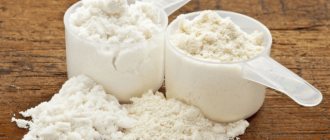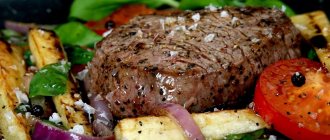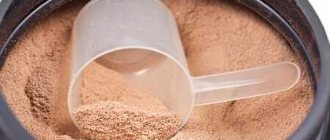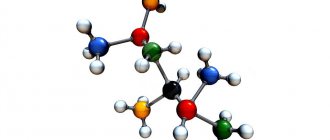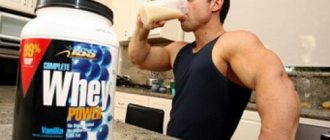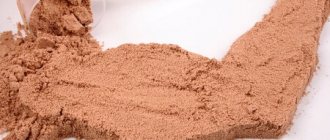Before introducing a new product into your diet, you should find out about its properties and what effect it has on body composition. Those who are prone to gaining extra pounds and seeking to stabilize their weight after recent weight loss should be especially careful. Protein mixtures are surrounded by many questions: what is the norm for protein consumption per day, what will happen if it is exceeded, is it possible to gain weight from protein. In this material you will find answers to these and many other questions.
For athletes, the benefits of protein mixtures are undeniable; it is present in the diet of each of them. Inexperienced beginners are wary of any sports nutrition. Some people do not understand the point of consuming protein and therefore do not want to spend money on it, others are afraid of side effects, for example, the appearance of excess weight.
Protein is an important micronutrient for weight loss
The term “protein” comes from the Greek word prōteios and means primary, basic . Together with fats, carbohydrates and water, it is one of the microelements that a person needs for the proper functioning of the body. Proteins are large molecules whose chains are made up of combinations of amino acids. They really are the “foundation” of the human body, because not a single cell of our body can exist without proteins. Protein functions can be divided into three main groups [1] [2] [3] [4]:
- ensuring the development and growth of muscles, bones, hair and skin
- production of antibodies, hormones and other necessary substances
- source of energy for cells and tissues of the body
The human body obtains protein from the diet or dietary supplements . The foods with the highest protein content are [1]:
- meat – all types of “red meat” and poultry
- Fish and seafood
- eggs and dairy products
- legumes and nuts
- some grains
Protein sources can be divided into three main categories based on their essential amino acid content [2]:
- Complete proteins – contain all the essential amino acids and include animal products such as meat, eggs and dairy products.
- Incomplete – contain at least one amino acid, mainly plant proteins such as peas, legumes or grains.
- Complementary is a combination of two or more foods that contain incomplete proteins. By combining them, you can get a complete source of protein.
Video: Famous fitness blogger about proteins
Tatyana Fedorishcheva is a fitness blogger with more than half a million subscribers. In her videos, the girl reveals many topics related to building a beautiful and slender body. Of course, she couldn’t ignore the topic of girls using protein supplements:
Protein food supplements in the form of powder concentrates for preparing cocktails enrich the diet of a losing weight girl with essential amino acids, help maintain muscle mass and lose fat. However, they are effective only if you follow a balanced diet with a 20% calorie deficit and subject to regular exercise.
Eating more protein is not the same as eating a high-protein diet
High protein diets (or protein diets) have gained significant popularity, and this type of diet is associated with increased protein intake. However, just because you eat enough protein doesn't mean you're on a high-protein diet . A higher proportion of calories from protein intake is important for this type of diet, but it is also often associated with reducing carbohydrate intake . Some of the most popular foods to limit include processed foods, baked goods, sweets, pasta and rice. [5] [6]
There are several types of diets that can be classified as high-protein, probably the most famous of them is the Atkins diet . This type of diet was discovered by Dr. Atkins in the 1970s and its goal is to put the body into a state of ketosis. On this diet, you can eat any amount of protein and fat , but you must significantly reduce your carbohydrate intake . Therefore, a lack of carbohydrates should cause fat to be burned instead of glucose. [5] [6]
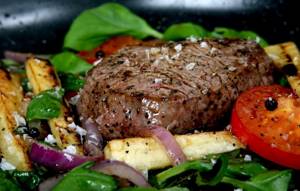
The effect of a protein diet and its impact on muscle growth and weight loss has been the subject of many studies. Several studies have shown the importance of such diets for a short period of time . Some studies indicate health problems with long-term adherence to such a diet. The authors of a 2014 study warned of a possible increase in kidney acidity and risk of health problems due to higher consumption of animal fats. [5] [15]
Another cause for concern with a high-protein diet is cutting down on carbohydrates , which can lead to health problems. Lack of carbohydrates in the diet puts children and young people at risk as it can lead to malnutrition. Meanwhile, most studies show that a high-protein diet helps you lose weight , at least only in the short term. The ideal solution would not be to completely give up carbohydrates, but to consume them in sufficient quantities to achieve your goals. [5] [15]
Which protein is best for weight loss?
There are several types of protein powder on the market. Each is a great help when losing weight or achieving other goals. There are some differences between different types of protein powder, so we'll list the most common and popular ones .
Whey Protein
Whey protein is one of the most popular protein sources , which contains all the essential amino acids and is therefore a complete source of protein. It is a protein mixture made from whey , which is a by-product of cheese production. Whey protein is high quality, highly digestible and contains minimal amounts of lactose. It is sold in the form of a concentrate containing 39-89% protein and an isolate or hydrolyzate containing 90-95% protein. [8] [9] [10]
A 2021 meta-analysis includes 9 studies on the effects of whey protein on weight loss in overweight and obese people. In the groups where participants consumed whey protein, results indicated significant reductions in weight and body fat percentage . In addition, improvements were found in the cardiovascular system blood pressure , cholesterol levels and blood sugar levels improved [18] [19]
The effect of whey protein on improving satiety was reflected in a study in which participants were divided into groups based on the type and amount of protein they consumed. The purpose of the study was to compare the effects on the body of a breakfast containing whey, soy or casein protein with 10% or 25% protein in the dish . At 10% protein, whey protein reduces hunger better than other sources. In the group that ate a 25% protein breakfast, there was no difference in satiety, but whey protein produced the strongest hormone and insulin . Based on the results, it can be seen that differences in satiety levels from consuming different types of protein powder occur when certain amino acid values exceed certain thresholds. This means that if you cook cereal for breakfast and add protein to it, the 10% whey protein content in the dish will help you feel as full as possible . If the protein content is 25%, the protein source does not matter since the amino acid content will be higher. [18] [20]
A further meta-analysis of several studies confirmed the effect of using protein in combination with strength training. Muscle growth in the upper and lower body was seen in participants who did strength training and took whey protein . [8] Whey protein is the most popular source of protein because it is readily available, contains all the essential amino acids, and is highly soluble. Want to learn more about the benefits of whey protein? Read our article - Which protein is better to choose? Whey concentrate, isolate or hydrolysate?

Casein
In addition to whey protein, milk also produces casein, which makes up 80% of the total protein content of milk. Although whey protein is water soluble, casein is the insoluble part of milk proteins. Casein is a complete protein source that differs from whey protein in its absorption time . Its longer absorption time causes a longer feeling of fullness , which plays an important role in losing weight. [8] [11]
Egg protein
Egg protein is made from egg whites that are separated and then dehydrated. One 30g dose contains approximately 105 calories and 23 grams of protein. Egg protein is an ideal alternative for those with milk intolerance or on the paleo diet . It is a source of vitamins and minerals found in eggs and is also low in fat and carbohydrates. [8] [12]
Soy protein
Soy protein is a plant source of all essential amino acids and is therefore classified as a complete protein . This is a product that is suitable for vegetarians, vegans and people looking for an alternative to animal proteins. [8]
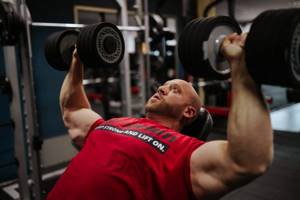
Rice protein
Rice protein is a plant source of protein that is considered incomplete because it contains only small amounts of lysine. In 2013, a study was conducted to compare the effect of rice and whey protein on weight loss . Participants were divided into two groups and asked to consume 48 grams of protein during their training days . [8] [13] [14]
Participants trained 3 times a week for 8 weeks and consumed protein immediately after training . At the end of the study period, both groups showed significant changes in body fat, muscle mass, and strength. The results confirmed that rice protein was as effective in weight loss as whey protein. [8] [13] [14]
How much protein should you take when losing weight?
The recommended daily protein intake depends on your goal, whether it's muscle growth or weight loss . Another important parameter is your weight . In the table you will find the daily protein intake per 1 kg of weight and conversion to average weight. [7]
| Squirrels | |
| In the absence of physical activity | 1.2 g/kg |
| If you are overweight | 1.2 – 1.5 g/kg |
| When playing sports, for the purpose of maintaining weight, performance and regeneration | 1.4 – 1.6 g/kg |
| When playing sports to build muscle mass | 1.4 – 2.4 g/kg |
| When playing sports to lose weight | 1.8 – 2.7 g/kg |
| Daily protein intake for men weighing 80 kg | Daily protein intake for women weighing 60 kg | |
| In the absence of physical activity | 96 g | 72 g |
| When playing sports, for the purpose of maintaining weight, performance and regeneration | 112 – 128 g | 84 – 96 g |
| When playing sports to build muscle mass | 112 – 192 g | 84 – 144 g |
| When playing sports to lose weight | 144 – 216 g | 108 – 162 g |

Protein No. 1: chicken egg
Eggs are an excellent source of protein and rank first in its quality.
A chicken egg provides the body with amino acids, which are used to restore muscle tissue. Add in tons of brain-boosting nutrients, plus healthy fats, and you've got a superfood that will satisfy your nutritional needs, fill you up, and help you get an enviable figure. The chicken egg has shown excellent results in studies of fat burning. Eating eggs has been found to improve metabolism and stabilize insulin levels. According to recent research, people who ate three eggs a day while on a low-carb diet lost more body fat (five kilograms over the course of the twelve-week study) than subjects who also ate a low-carb diet but did not eat eggs.
Just look at all the beneficial properties of eggs:
- A chicken egg ranks second after milk in terms of the concentration of leucine, which is the most important amino acid for muscle formation.
- Eggs contain choline, which the body uses to produce the essential neurotransmitter acetylcholine, which improves brain function and increases motivation.
- Choline found in chicken eggs also enhances liver detoxification and prevents fat accumulation, and a healthy liver in turn ensures good metabolism and efficient energy production.
- A chicken egg contains two important fat-soluble vitamins - D and K, which are highly bioavailable, which ensures their maximum absorption. Both vitamins are necessary for the construction of bone tissue, and vitamin D is also involved in metabolic processes, and is also necessary for the development of muscle strength and quality.
- Eggs are rich in antioxidants such as selenium, lutein and zeaxanthin, which reduce inflammation in the body and help improve overall health.
Eggs for breakfast instead of porridge or sandwiches provide glucose tolerance, while also providing satiety with food. This is the most valuable source of protein for everyone involved in sports and caring about their figure. Scientists have long proven that egg whites increase energy production, stimulate protein synthesis, and promote recovery after intense workouts.
Some tips
- Protein drinks are not a complete replacement for a balanced diet . Remember to consume other nutrients such as fiber, vitamins, minerals, and complex carbohydrates and healthy fats in your diet
- Protein-rich foods are often a source of other nutrients , such as B vitamins, iron, or zinc.
- Some protein drinks may also contain various sweeteners , so check the carbohydrate content.
- Protein intake does not vary by gender . Lower protein intakes in women are due to their lower weight and possibly different fitness goals .
- A protein bar is certainly a better snack than a regular bar, but it all depends on its composition. Many "protein bars" may contain lower amounts of protein and higher amounts of carbohydrates and fats. You should always check the nutritional value when purchasing. [3] [17]

Modern diets and magical remedies constantly appear in the media that will “help” get rid of excess fat . The best way to lose weight is proteins , which improve metabolism, muscle growth and prevent evening overeating. Whether you choose to consume proteins through food or supplements, be sure to ensure your body's processes are working properly.
We believe that you have learned everything important about proteins and their importance in losing weight . Want your friends to know more about this topic? Then be sure to support our article by reposting.
How to take protein supplements?
Practice shows that in order to lose weight, it is most advisable to consume protein three times a day: in the morning as a first breakfast, a couple of hours before training and an hour after it. You don't need to eat anything else with your cocktail.
When planning a diet, calculate the amount of protein you need as 1.5-2 g per kilogram of ideal weight (not what you currently have, but what is normal for your height and age). At the same time, you should get at least half of your protein from food, the rest from supplements.
During the day, distribute meals as follows:
- Eat slow carbohydrates (porridge) in the first half of the day (for breakfast or lunch).
- For lunch, combine a small amount of carbohydrate food with protein and a good portion of non-starchy vegetables.
- Dinner should be predominantly protein. Vegetables rich in fiber are also welcome.
- During the day, it is important to consume the right amount of healthy fats, the sources of which are seeds (for example, flax), nuts, vegetable oils (olive oil is very healthy), and fatty sea fish.
Many young ladies who are losing weight complain about a lack of energy during training when taking protein two hours before it - they simply have time to get hungry. It is not advisable to reduce the time to an hour - the protein will still not be fully absorbed, and you will not get the energy you need. It is better to drink a protein shake two hours before class, and eat some fruit an hour before it.
Keep in mind that no more than 30 g of protein can be absorbed at one time, regardless of its source - be it meat, fish, cottage cheese or a protein shake. So there is no point in increasing the dose beyond this norm.


